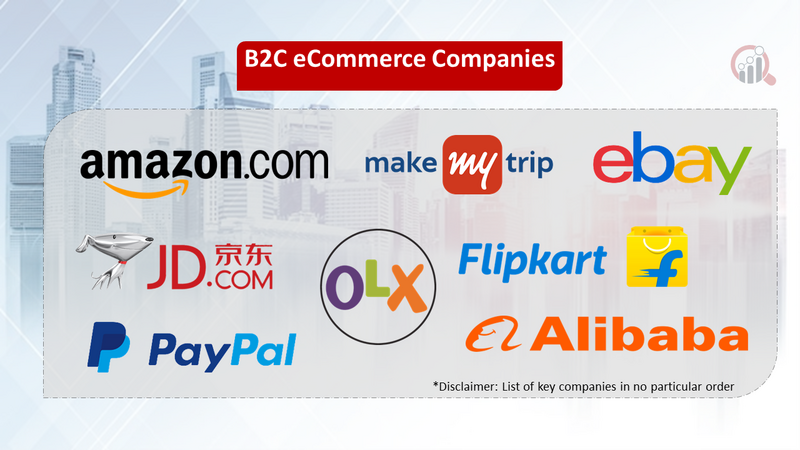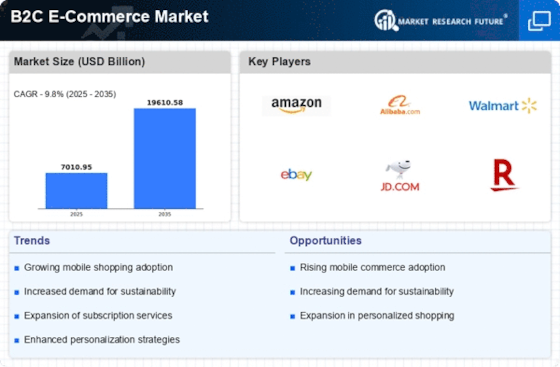Top Industry Leaders in the B2C eCommerce Market

The B2C E-Commerce Landscape: A Battleground for Giants and Challengers
The B2C e-commerce market is a dynamic battlefield, where established giants like Amazon, Alibaba, and Walmart clash with nimble niche players and innovative startups. Understanding the competitive landscape is crucial for anyone navigating this ever-evolving terrain.
Key Players:
-
Alibaba Group Holding Limited
-
Amazon.com, Inc.
-
ASOS
-
eBay Inc.
-
Flipkart Internet Private Limited
-
JD.COM, Inc.
-
MAKEMYTRIP PVT. LTD.
-
OLX
-
PayPal, Inc.
-
Craigslist, Inc.
Factors for Market Share Analysis:
-
Revenue and Gross Merchandise Value (GMV): These metrics measure the financial size and transaction volume of an e-commerce player.
-
Product Range and Category Focus: Understanding the breadth and depth of a company's offerings provides insight into their target audience and competitive advantages.
-
Customer Acquisition and Retention: Analyzing marketing strategies, customer engagement, and loyalty programs reveals a company's ability to attract and retain customers.
-
Logistics and Delivery Infrastructure: Efficient delivery networks and fulfillment capabilities are crucial for customer satisfaction and competitive edge.
-
Technology and Innovation: Adoption of AI, personalization, and other cutting-edge technologies can significantly impact customer experience and operational efficiency.
New and Emerging Companies:
-
Social Commerce: Platforms like TikTok and Instagram are increasingly integrating shopping features, creating a new avenue for e-commerce growth.
-
Direct-to-Consumer (DTC) Brands: By cutting out middlemen, DTC brands offer personalized products and experiences, disrupting established categories.
-
Subscription-based Models: Companies like HelloFresh and Dollar Shave Club are gaining traction with recurring revenue models, fostering customer loyalty and predictable income streams.
Current Investment Trends:
-
Sustainability and Ethical Sourcing: Consumers are increasingly conscious of environmental and social impact, driving investment in eco-friendly practices and ethical sourcing.
-
Personalised Shopping Experiences: AI and data analytics are being used to personalize product recommendations, promotions, and marketing, enhancing customer engagement.
-
Augmented Reality (AR) and Virtual Reality (VR): These technologies are being explored to create immersive shopping experiences, allowing customers to virtually try on clothes or tour furniture in their homes.
-
Voice Commerce: Smart speakers and voice assistants are opening up new avenues for hands-free shopping, with companies investing in voice search optimization and conversational AI.
Latest Company Updates:
- January 26, 2024: Amazon Q4 Earnings: Amazon's holiday quarter results beat analyst expectations, with revenue up 9% year-over-year. However, the company's cloud computing arm, AWS, showed signs of slowing growth.
- January 18, 2024: Walmart's TikTok Partnership: Walmart has partnered with TikTok to launch live shopping experiences on the platform, targeting Gen Z and millennial shoppers.










